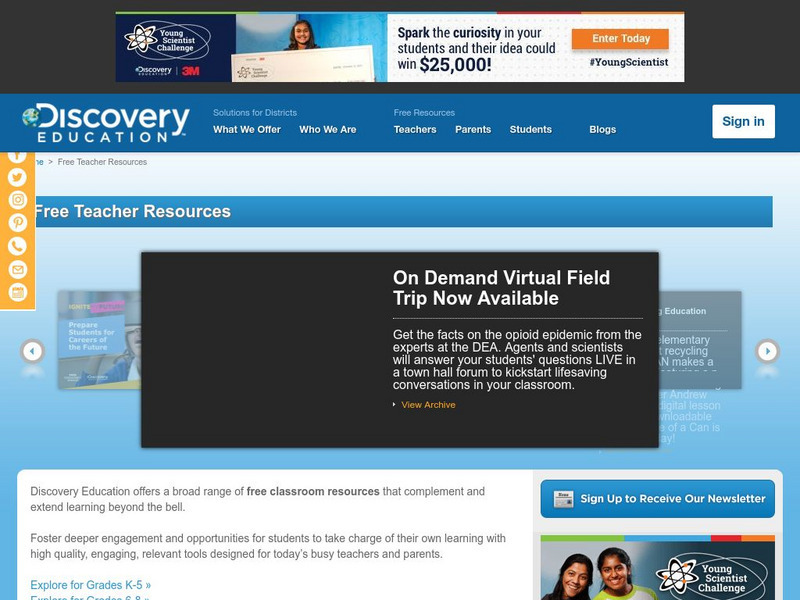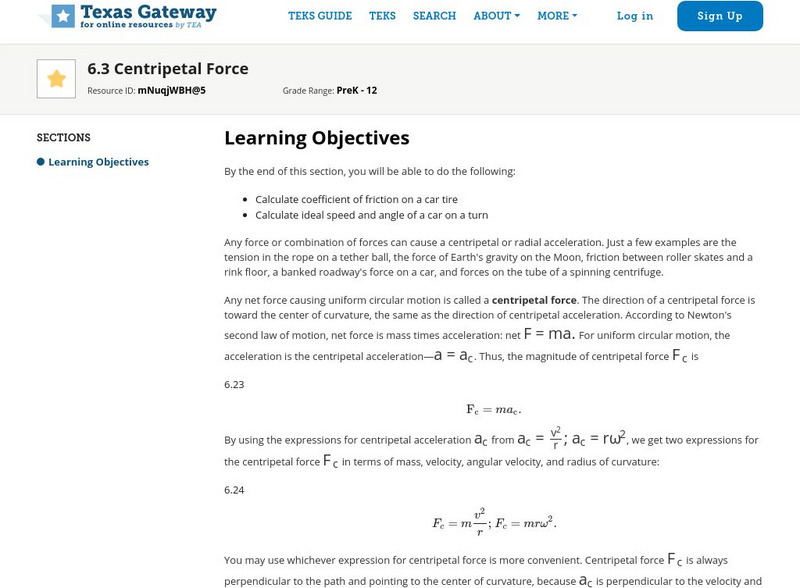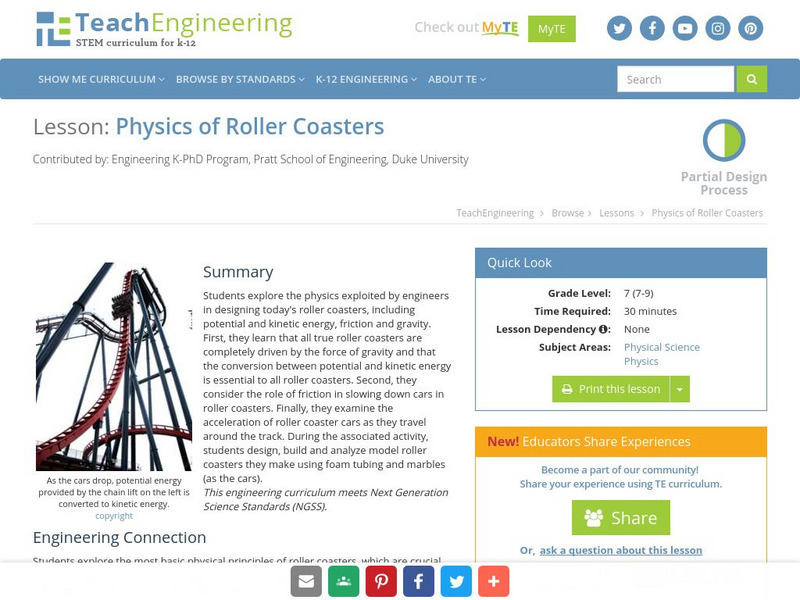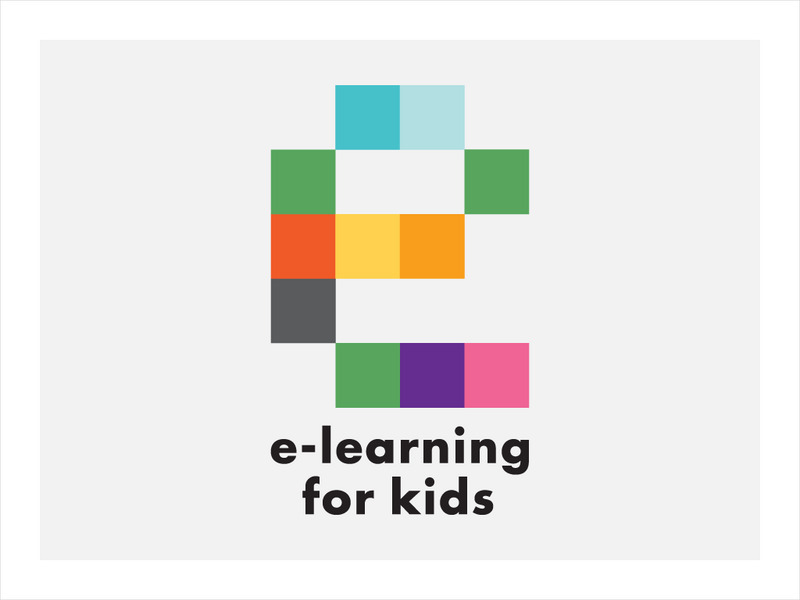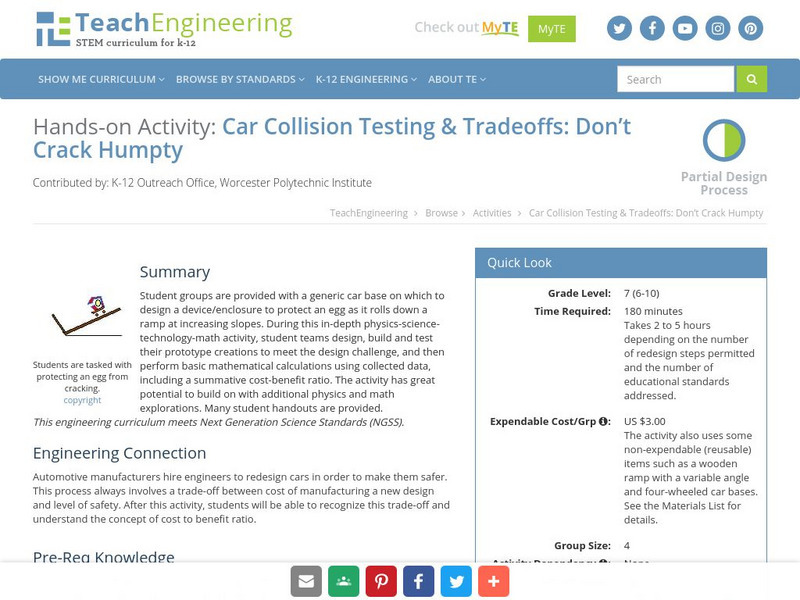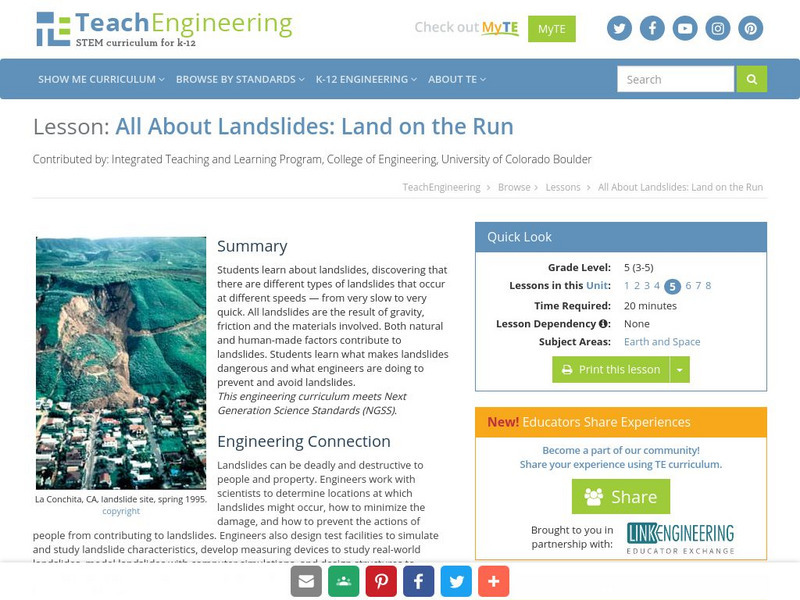Hi, what do you want to do?
Curated OER
Science Quiz-Grade 6
In this grade 6 science quiz worksheet, 6th graders complete a 15 question multiple choice quiz covering a variety of grade 6 concepts.
Curated OER
Simple Harmonic Motion
Students explain the theory of simple harmonic motion (SHM) by performing hands-on, practical application experiments.
Khan Academy
Khan Academy: Modeling Gravity and Friction
Application of Newton's Law of force and gravity to computer graphic programming.
TeachEngineering
Teach Engineering: Riding the Gravity Wave
Students write a biographical sketch of an artist or athlete who lives on the edge, riding the gravity wave, to better understand how these artists and athletes work with gravity and manage risk. Note: The literacy activities for the...
E-learning for Kids
E Learning for Kids: Science: Indian Ocean: What Kind of Natural Forces Do We Recognize?
Learn about forces (push or pull), gravity, and friction in this module by training dolphins.
Discovery Education
Discovery Education: Rules of Forces and Motion
With this hands-on lesson, help students understand force, gravity, friction, and speed. Students will also learn how each of these concepts affects the another.
Discovery Education
Discovery Education: Physical Science: Gravity Gets You Down
In this lesson, students make predictions about falling objects of different sizes and masses to learn about gravity and air resistance. Includes audio vocabulary list and extension activities.
Texas Education Agency
Texas Gateway: Uniform Circular Motion and Gravitation: Centripetal Forces
By the end of this section, you will be able to calculate coefficient of friction on a car tire and to calculate ideal speed and angle of a car on a turn.
Other
Bscs: Forces and Motion Content Background Document
In this document, we will try to answer a fundamental question of physical science, "Why do things start to move, slow down, speed up, stop moving or change direction?" In answering these core questions we can develop concepts that can...
TeachEngineering
Teach Engineering: Physics of Roller Coasters
Students explore the physics utilized by engineers in designing today's roller coasters, including potential and kinetic energy, friction, and gravity. First, students learn that all true roller coasters are completely driven by the...
Science Education Resource Center at Carleton College
Serc: Investigating Gravity: Predicting Time to Hit the Ground
Students will drop and shoot horizontally "Nerf" balls from a variety of known heights then record the amount of time it takes for the ball to hit the ground for each trial. They will plot height vs. time data and create a trend line for...
E-learning for Kids
E Learning for Kids: Science: Pirates: What Are Some Forces Around Us?
Covers the meanings of force, friction, and gravity, and the differences between magnetic and elastic spring force, and between weight and mass. The effect of air resistance on an object's motion is also touched upon.
TeachEngineering
Teach Engineering: Mechanics Mania
Through ten lessons and numerous activities, students explore the natural universal rules engineers and physicists use to understand how things move and stay still. Together, these rules are called "mechanics." The study of mechanics is...
My Science Site
Forces and Motion [Pdf]
This resource provides reproducibles that aide in student learning of force and motion. Also offers hands-on and cooperative learning activity ideas as well as an ESL/ELD activity. This resource is in PDF form; requires Adobe Reader.
TeachEngineering
Teach Engineering: It Takes Two to Tangle
Students explore the theme of conflict in literature. They learn the difference between internal and external conflict and various types of conflicts, including self against self, self against other, and self against nature or machine....
eSchool Today
E School Today: All About Forces
Forces are everywhere. Learn what they are, the characteristics of forces, different kinds of forces, and factors that affect them.
TeachEngineering
Teach Engineering: Car Collision Testing & Tradeoffs: Don't Crack Humpty
Student groups are provided with a generic car base on which to design a device/enclosure to protect an egg as it rolls down a ramp at increasing slopes. During this activity, student teams design, build and test their prototype...
University of Colorado
University of Colorado: Ph Et Interactive Simulations: Masses and Springs
Use this interactive, animated lab to explore conservation of mechanical energy.
Channel 4 Learning
4 L: Science Essentials: Get Physical
Find a review of many aspects of the physical world. Simple explanations of electricity, gravity, and the solar system. Included are materials for teachers to use for enrichment.
TeachEngineering
Teach Engineering: Land on the Run
Students learn about landslides, discovering that there are different types of landslides that occur at different speeds - from very slow to very quick. All landslides are the result of gravity, friction and the materials involved. Both...
TeachEngineering
Teach Engineering: Wow! That Captures It!
Students learn how motion capture (mo-cap) technology enables computer animators to create realistic effects. They learn the importance of center of gravity in animation and how to use the concept of center of gravity in writing an...
Other
Center for Education Partnerships: The Marble Roll
In this Science-athon, students try to make their marble roll the farthest across a flat surface, using their knowledge of forces, motion, and energy to guide them through their apparatus design. Teachers must enroll online.
University of Colorado
University of Colorado: Ph Et Interactive Simulations: Pendulum Lab
An interactive simulation that teaches about periodic motion, simple harmonic motion, and conservation of energy. Observe one or two pendulums to determine how the swing is influenced by the length of the string, the mass of the pendulum...
TeachEngineering
Teach Engineering: Couch Potato or Inertia Victim?
Students design a simple behavioral survey, and learn basic protocol for primary research, survey design and report writing. Note: The literacy activities for the Mechanics unit are based on physical themes that have broad application to...











